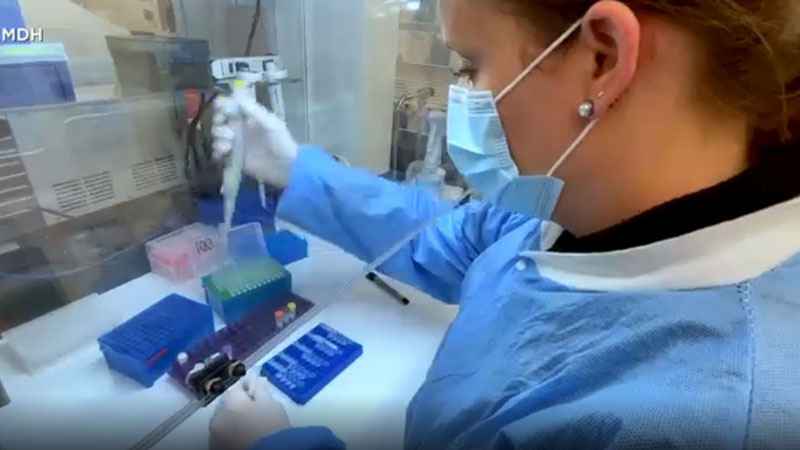The Race: Vaccine vs. Variant
[anvplayer video=”5016867″ station=”998122″]
With pandemic fatigue setting in and families departing for spring break, health officials are sounding the alarm over what has turned into a clear race between the vaccine and a variant of the COVID-19 virus that is now rapidly spreading through the state.
Health officials announced this week that the B.1.1.7. Variant of COVID-19, also known as the UK variant, is now considered to be widespread in Minnesota.
Inside a laboratory at the Department of Health, several hundred COVID-19 cases are being tediously analyzed under a microscope every week to identify and get ahead of an outbreak.
“Because we’re looking, we’re finding it. And because we’re finding it, we’re able to put some additional mitigation efforts in place,” said Sara Vetter, who is leading the effort inside the lab.
This effort first came to light earlier in March when officials spotted a growing number of cases in the southwest metro that tested positive for the UK variant. It’s believed to spread easier and make people sicker.

[KSTP]
State health officials warn UK virus variant now considered to be widespread in Minnesota
At that time, officials encouraged youth sports in the area to shut down for two weeks to try and blunt an outbreak.
“We were two weeks away from our championship meet, and we worked really hard,” said Heidi Miler, Coach of the West Express Swim Team in Chaska. The shutdown meant an early end of the season for many of the swimmers.
“We know there’s a lot of people really sick and some people have died at the very end. So we want to keep the bigger picture in perspective, too,” she said.
The problem, according to state health officials, is this particular variant-led surge is flourishing in teens and young adults, the group yet to be vaccinated. Officials believe youth sports are a driving factor.
“There’s going to be an increased pressure on the group of unvaccinated people,” said Stephanie Meyer, an epidemiologist with the Minnesota Department of Health who is focused on tracing cases that are positive for the more contagious variant.
The agency is using a process known as whole genome sequencing, where scientists actually look at the genetic makeup of an infection under a microscope and see whether it matches the variant.
The state’s public health lab is analyzing a smaller fraction of total cases — about 500 a week — to try and gauge how fast the variants are spreading.
“It appears that the transmissibility of it is increased 50% over what we’re used to seeing with COVID-19,” Meyer said. “I think our hope is that we’ll see less severe disease, but it’s still pretty early to say.”
Right now about half of the samples analyzed are coming back positive for the variant, in part because officials say they’re looking in areas where they expect to find it.
Beyond the southwest metro, state officials are also tracking an outbreak of the UK variant in the Mankato-Blue Earth region, as well as in St. Louis County. They fully expect the more contagious variant to become the dominant strain in Minnesota soon.
The latest uptick in positive cases is why officials are desperately trying to get as many people as possible vaccinated.
“I can’t emphasize this point enough. We’re in a race between the variant and the vaccine,” said Kris Ehresmann, head of infectious disease at MDH earlier this month. “The decisions we all make in the next few weeks will have a lot to say about the outcome of this race.”